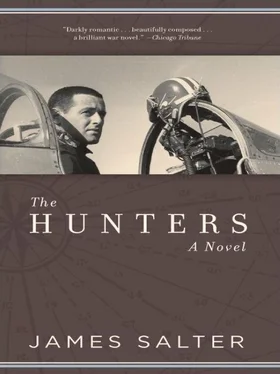“No, it wasn’t,” Cleve agreed, although he felt very spent.
“They were too cagey today. It’s usually like that when the fight is in the cons. They can see you too easily, and you can’t get close to them. Not only that, but they just didn’t seem to want to mix it up this time.”
“I thought they were doing their share.”
“What do you mean?”
“It seemed we were playing it pretty safe,” Cleve said.
“You got back, didn’t you?” Desmond said flatly.
“So did they.”
There was a silence. Cleve regretted having said it.
“You did a good job, Cleve,” Desmond said simply.
“Thanks.” He thought with despair that it had not been as he had anticipated, easy fight or not. He was going to have to push himself beyond what he had expected. A sense of inadequacy made him feel exhausted and as fragile as a dry stalk.
At debriefing they learned that Robey had gotten his fifth. It was the only kill claimed. He was standing in a crowded circle at one of the tables, grinning and being congratulated, telling the colonels how he had done it. Imil was beaming, and even Moncavage nodded his head happily. Cleve followed Desmond into the group to shake the triumphant hand.
“How did you get him, Robe?” Desmond asked.
“On a head-on pass. I got some good hits, and he bailed out. At forty thousand. Opened his chute at forty thousand, too. He’s probably still floating down.”
“Nice going.”
“Thanks.”
“Congratulations,” Cleve said.
“Thank you.”
They moved aside. Other men were pushing in to hear about it. As they walked away from the building, somebody asked Desmond what had happened.
“They were up.”
“How many?”
“Seventy or eighty, I guess.”
“Did anybody do any good?”
“Robey got one.”
“A kill?”
“Yes.”
“That unconscious bastard. Nobody else?”
“Not that I know of.”
“Did he really get this one for a change?”
Desmond did not answer. They walked on. It was still early in the morning, just after eight. If they drove to the mess, they might be able to get something to eat, even though it was after breakfast hours. When they were driving along a few minutes later, Cleve asked about the remark.
“I won’t say he didn’t get them,” Desmond replied, “but two of them were pretty doubtful.”
“How does he get credit for them if there’s any question?”
“All he has to have is his wingman’s confirmation, whether his film turns out or not. First, it’s a damage; he thinks he saw a couple of hits when he was firing. Then, when he talks to his wingman after they land, they decide it must have been a probable; and at debriefing they get carried away listening to the other claims, and it’s turned into a kill.”
“How often does that happen?”
“It happens. Robey’s first one, for instance. He was up around Sinanju with his flight, going north, and they made a head-on pass with some MIGs at about thirty thousand. That was all there was to it. By the time they were able to turn around, the MIGs were gone. When they got back after the mission, Robey claimed the one he was shooting at. Dawes was his wingman, but he wouldn’t confirm it. He said he hadn’t seen a thing. All he’d admit was that they saw a column of smoke on the ground a little later. Robey said that was where the MIG had crashed.
“Well, it was at a time when there hadn’t been any action for about a week or more, and Dutch was particularly anxious to see kills; so he took Dawes aside and talked to him. You can imagine what that was like. Dawes was a second lieutenant.
“‘Now, Dawes,’ he said, ‘you understand that Captain Robey can’t get credit for that MIG he shot down unless you confirm it, don’t you?’
‘“Yes, sir,’ Dawes said.
“‘All right. Then you did see him do it, didn’t you?’
“‘No, sir. That’s just it. I didn’t see a thing. I was shooting, too.’
“‘Try to remember, Dawes,’ Imil said. ‘It may have all happened quickly, but you did see that MIG go down, didn’t you? Think back. Think hard.’
“‘No, sir. I really didn’t.’
“‘You’re not trying to remember, Dawes. Think. Think of your career, Dawes.’
“‘As a matter of fact,’ Dawes said, ‘I do seem to recall seeing that MIG smoking.’
“‘Certainly you did.’
“‘Yes. That’s right. It was on fire. Now that I think back, I remember it. He got it, all right. There’s no doubt about it.’”
“Is that the truth?” Cleve said. He was not easily shocked.
“Ask Dawes.”
They sat down to coffee and toast. Several people stopped at the table to ask about the mission. News of it had traveled with incredible speed, Cleve found. He still felt no more than a meager satisfaction at having participated in it; but he was also aware of some sort of mystic fulfillment, as if the fight were a kind of nourishment or a violent poison, repeated small doses of which would eventually confer immunity.
Cleve was made a flight commander a few days later. The four flights in the squadron lived in a single long barracks in which each had its own room. After the houseboy had moved his bag in and made up a cot, Cleve came in himself.
It was a large room, but crowded, with walls of a sooty white. There was a debris of furniture that had been made from the wood of packing crates: wardrobes, cabinets, a ponderous table, and several awkward chairs. A mosaic of women in clippings of every size was on one wall from the ceiling down almost to the floor, and four or five feet wide. Cleve was overwhelmed by the litter. The windows had occasional squares of cardboard for missing panes, and not much light came through them. Near the door was a long wooden rack loaded with good uniforms for leave in Japan, steel helmets, overcoats, and gas masks. It made entering the room like coming into a den.
Four men were sitting around the center table, talking, when he came in. Two of them, the second lieutenants, had moved in only a few days earlier. An air of idleness surrounded them all. They had endless time before them, it seemed, in this waiting room of some isolated station. Whatever conversation they had been having was suspended as they greeted Cleve. He had met them all previously; but as he unpacked and began talking to them for what was really the first time, he felt the mutual sizing up, as if they were being cast adrift in a small boat together.
DeLeo, who had lived there next to the longest, stood up and went to a window, slid it open, and reached out into a wooden box nailed facing the casement.
“A beer?” he asked Cleve. “They’re ice cold.”
“So am I; but thanks, I’ll have one.”
DeLeo extracted three cans. He carried them back to the table and opened them. He handed the first one to Cleve and the second to Daughters. Then he sat down and picked up his own. He was tall and capable looking, with black hair and an exaggerated black mustache. His teeth were very white and even.
“Well, here’s good luck to you, Captain,” he said, “from your new boys, such as they are. You’re not getting much to work with, I can tell you that: an arithmetic teacher, a wop, and two eagle scouts.”
“All right. I’ll drink to that. You’re not getting so much either.”
“That’s not what I hear.”
Cleve felt the glances of the lieutenants on him as he drank. They were looking toward him casually, but with respect.
“Before it passes unchallenged,” Daughters said, “I wasn’t an arithmetic teacher. He just likes the sound of that. I actually coached the baseball and basketball teams and only filled in as a teacher.”
“What do you want me to call you?” DeLeo said. “Coach?”
Читать дальше












